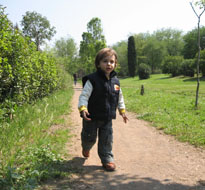Since its creation in 1965, Head Start, the federal program that provides preschool education, medical care, nutritional counseling and parenting support for low-income families has often been touted as an important public policy success. Children enrolled in the program receive varying degrees of support until they reach kindergarten. While research suggests that the program’s overall efficacy is positive when children are participating, questions remain about the duration of its impact as students advance through school.
A 2010 report by the Department of Health and Human Services (DHHS), “Head Start Impact Study,” examines the cognitive development, social-emotional development, and physical health outcomes of Head Start students as compared to a control group that attended private preschool or stayed home with a caregiver. Head Start students were split into two distinct group — 3-year-olds with two years of Head Start before kindergarten, and 4-year-olds with only one year of Head Start before kindergarten.
The report’s findings include:
- Though the program had a “positive impact” on children’s experiences through the preschool years, “advantages children gained during their Head Start and age 4 years yielded only a few statistically significant differences in outcomes at the end of 1st grade for the sample as a whole. Impacts at the end of kindergarten were scattered…”
- After first grade, there were no significant social-emotional impacts for the cohort of 4-year-olds, and mixed results on measures of shyness, social withdrawal and problematic student-teacher interactions. The cohort of 3-year-olds with two years of Head Start attendance, however, manifested less hyperactive behaviors and more positive relationships with parents.
- By the end of first grade, only “a single cognitive impact was found for each cohort.” Compared to students in the control group, the 4-year-old Head Start cohort did “significantly better” on vocabulary and the 3-year-old cohort tested better in oral comprehension .
- Parents of students in the 3-year-old cohort were 7% less likely to spank them and more likely to read to them and involve them in cultural enrichment activities versus parents of 3-year-olds in the control group.
The report sums up the findings as follows: “Head Start has benefits for both 3-year-olds and 4-year-olds in the cognitive, health, and parenting domains, and for 3-year-olds in the social-emotional domain. However, the benefits of access to Head Start at age four are largely absent by first grade for the program population as a whole. For 3-year-olds, there are few sustained benefits, although access to the program may lead to improved parent-child relationships through 1st grade, a potentially important finding for children’s longer term development.” These findings are supported by a subsequent DHHS study published in 2012.
A related study for the National Bureau of Economic Research, “Does Head Start Do Any Lasting Good?” provides additional information on the 2010 DHHS report and calls into question some of the findings.
Tags: children, poverty, parenting


Expert Commentary